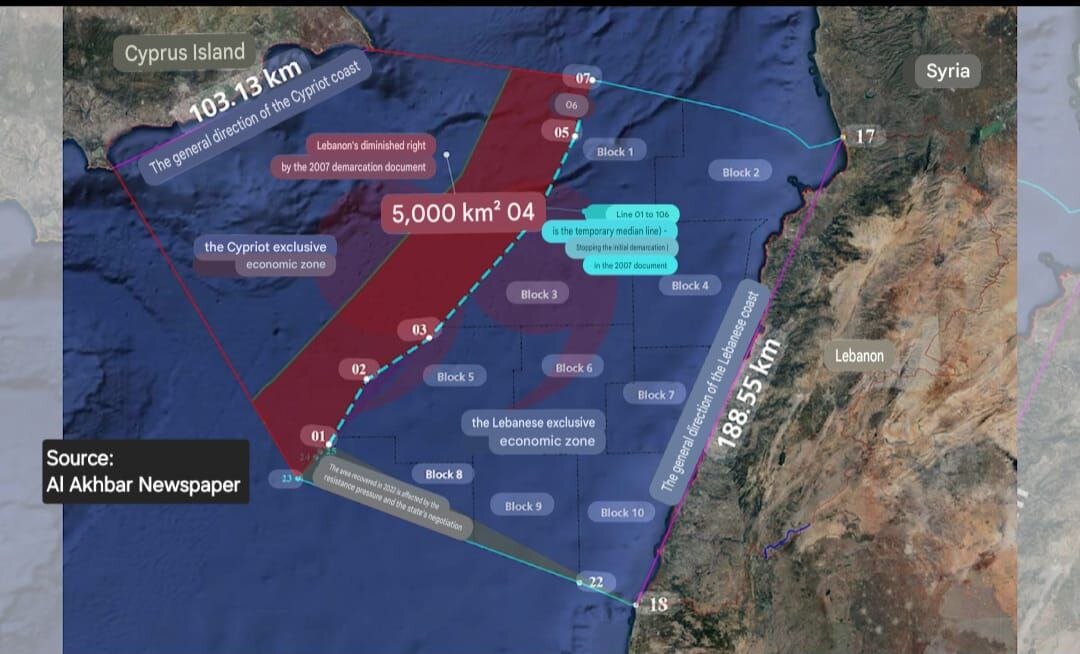How Nawaf Salam’s cabinet is handing maritime resources to Israel!

BEIRUT — On October 23, 2025, Lebanon crossed a perilous threshold under Nawaf Salam’s leadership, with his cabinet appearing almost dedicated to national self-sabotage.
After failing to contain Lebanon’s financial collapse or social despair, Salam’s cabinet has now inflicted a strategic disaster — one signed not in error, but in submission — by recklessly managing maritime demarcation with Cyprus and southern oil exploration.
This blunder is not administrative; it is political servitude as it serves, in every practical sense, the interests of the Israeli enemy and the dictates of Washington, which has long sought to impose a fait accompli in the Eastern Mediterranean — confining Lebanon and expanding Israel’s room to plunder regional gas fields with a “legal” smile.
The government’s decision to adopt the 2007 maritime agreement with Cyprus “as is,” according to the so-called median line, effectively relinquishes nearly 5,000 square kilometers of Lebanese waters — territory confirmed by army and research studies as part of Lebanon’s natural continental shelf.
In plain terms, this means transferring potential gas fields to indirect Israeli control via the Cypriot-Israeli pact of 2010.
Incredibly, the Lebanese Army’s representative, naval officer Mazen Basbous, and legal consultant Najib Masihi justified this surrender by arguing that “international arbitration would change nothing” and that revising Decree 6433 was pointless.
The logic of Salam’s cabinet could only please Tel Aviv as it ignores the very spirit of international maritime law, which demands not arithmetic symmetry but equitable outcome.
Articles 74 and 83 of the UN Convention on the Law of the Sea (UNCLOS)— alongside a mountain of international precedents — affirm that fairness, not geometry, governs demarcation.
Equity considers coastlines, geography, and proportionality. Lebanon, with its modest coast, cannot be equated with an island like Cyprus encircled by open seas.
By treating the “median line” as divine scripture, the government has shrunk Lebanon’s maritime rights while inflating Cyprus’s share — and, conveniently, Israel’s reach.
Tel Aviv, through its 2010 agreement with Nicosia, had already bypassed Lebanese Point 1, carving a disputed triangle south of Point 23 — the very zone now teeming with Israeli energy ambitions.
The farce deepens when one recalls that Cyprus itself is a fractured entity: divided between Greek and Turkish administrations, dotted with two British sovereign bases, and stripped of full independence.
How does Lebanon justify a binding maritime accord with a state that cannot even control its own shores?! But logic has little room in Salam’s cabinet, where the compass points only to the U.S. espionage den (the embassy).
In the October 23 session, Washington’s fingerprints were everywhere. Lebanon’s “technical decision” was nothing but a political bow — a compliance act to secure Western nods while surrendering the nation’s maritime future.
The same pattern haunts the government’s approach to oil and gas exploration in Block 8. The French company Total, whose loyalty to Paris and Tel Aviv outweighs its interest in Beirut, was granted exploration rights — only to request a three-year postponement.
The government, ever eager to oblige, approved it, ignoring a free offer from the Norwegian-American firm TGS to conduct a 3D survey covering 1,200 square kilometers at no cost. It’s a case study in how to block your own economy to keep Israel drilling undisturbed.
This isn’t mere negligence; it’s policy. Lebanon’s rulers have mastered the art of surrender, disguising betrayal as diplomacy and labelling foreign pressure as “stability.” Yet that so-called stability is nothing but Israeli supremacy dressed in Western PR.
Salam’s government has acted less like a sovereign authority and more like a regional branch of the U.S. State Department. It disregarded the Army’s reservations, silenced national experts, and marketed its abdication as “routine housekeeping.”
What it really executed was a quiet liquidation of Lebanon’s maritime wealth — a sale conducted behind closed doors and paid for in silence.
If this trajectory persists, Lebanon will soon forfeit not just its gas fields but the last shreds of its sovereignty. Each concession at sea mirrors a concession in politics, both sailing under the same flag of dependency.
While neighboring states rush to safeguard their resources, Lebanon is perfecting the art of self-erasure — surrendering its treasures to its enemies, one decree at a time. Yet what was lost in ink can be reclaimed in will. Maps can be redrawn, but dignity must first be rediscovered.
When Lebanon decides that its sea is not for sale and that sovereignty is not drafted in embassies but defended in trenches — only then will the tide turn.
Until that day, Nawaf Salam’s cabinet will be remembered not as a government, but as a footnote in the long, shameful chronicle of national abandonment.
Leave a Comment